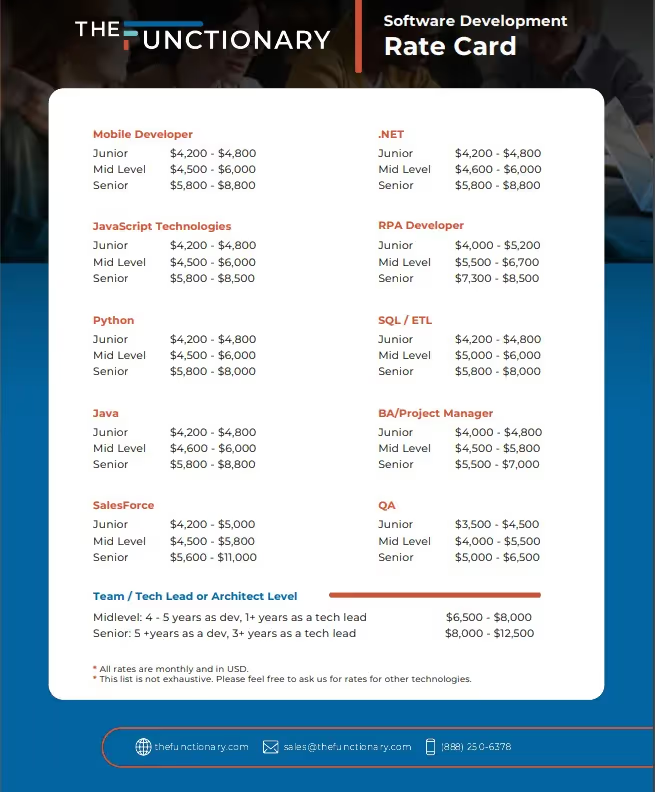Companies need to identify dependable partners who can offer effective staffing solutions in an environment where the business landscape is changing rapidly. Originally founded as a contact center, The Functionary has evolved over time to become a flexible "solutions provider". Their entry into the software development services industry is particularly notable, and their personnel and talent acquisition strategies have garnered attention.
The Functionary's Cost for Companies in the U.S.
Our pursuit of transparency led us to request a call with The Functionary to understand their pricing intricacies. However, the response only raised more questions. The table of prices sent via email lacked specifics on how much each candidate receives, leaving a gap in understanding the true distribution of the client's investment.

During the call, queries about the breakdown of charges were met with broad statements. The Functionary asserted that their rates encompassed everything – from logistics and payments to benefits, health, and their profit margin. However, critical details, such as the percentage or amount allocated to each component, remained elusive.
Although The Functionary presents itself as a flexible solutions provider, our investigation into their pricing strategy revealed several details that require close examination. We had an open discussion to gain clarity on certain responsibilities that are essential for teams focusing on technology. This is what we found:
- JavaScript Technologies Senior: $5,800 - $8,500 per Month
- QA Senior: $5,000 - $6,500 per Month
Comparatively speaking, Teilur Talent offers reasonable fees for comparable positions, ensuring the mutual benefit of clients and candidates. Our pricing clearly reflects our commitment to transparency, as follows:
- QA Senior: $3,125 - $5,625 per Month
- Full Stack Developer: $5,625 - $7,750 per Month
Additionally, Teilur Talent's pricing model is open and clear, with a 20% charge that allows candidates to keep 80% of the entire amount paid by clients in the US or Canada.
Our investigation uncovered possible flaws in The Functionary's strategy for developing remote teams. Certain factors require careful attention, ranging from minimum commitments and candidate replacement processes to concerns about candidate availability and exclusivity:
Minimum Commitments: While flexibility is crucial, some areas require a minimum of 5 persons, which may limit options for clients who initially prefer a smaller team.
Candidate Replacement: While the promise of replacements is reassuring, the potential downtime and project disruptions during this process present issues for customers.
Candidate Availability: The time-consuming stages involved in candidate selection, such as cultural fit evaluations, interviews, and onboarding, may conflict with urgent staffing demands.
Flexibility and Exclusivity: The Functionary's methods are unclear, raising concerns about client involvement in candidate substitution and exclusivity.
Our Thoughts on The Functionary's Pricing Structure
As we navigate this complexity, our discoveries lead us to reconsider the cost-benefit balance. While The Functionary may provide solutions, we are concerned about the lack of transparency and the potential challenges that clients may face.
Finally, the intricacies of The Functionary's pricing mechanism highlight the importance of making informed decisions. Understanding the nuances of pricing, commitments, and potential drawbacks becomes crucial as firms seek trusted partners for remote team creation. Our investigation can assist firms in building productive, cost-effective, and transparent remote teams.
Explore our website at Teilur Talent and find a convenient budget calculator bellow. Our hiring costs are flexible and determined by the candidate's accepted offer. Use our calculator to estimate the cost of various roles.
Also, explore Tecla pricing model and gain insight into how much they charge clients in comparison to other players in the market.







